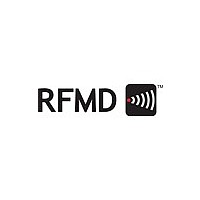RF2052TR7 RFMD, RF2052TR7 Datasheet - Page 10

RF2052TR7
Manufacturer Part Number
RF2052TR7
Description
IC RF MIXER PLL/VCO 32-QFN
Manufacturer
RFMD
Datasheet
1.RF2052TR7.pdf
(38 pages)
Specifications of RF2052TR7
Rf Type
UHF, VHF
Frequency
30MHz ~ 2.5GHz
Number Of Mixers
1
Gain
-2dB
Noise Figure
12dB
Secondary Attributes
Up/Down Converter
Current - Supply
75mA
Voltage - Supply
2.7 V ~ 3.6 V
Package / Case
32-VFQFN Exposed Pad
Lead Free Status / RoHS Status
Lead free / RoHS Compliant
Other names
689-1089-2
Available stocks
Company
Part Number
Manufacturer
Quantity
Price
Company:
Part Number:
RF2052TR7
Manufacturer:
RFMD
Quantity:
9 200
RF2052
The RF2052 is a wideband RF frequency converter chip which includes a fractional-N phase-locked loop, a crystal oscillator cir-
cuit, a low noise VCO core, an LO buffer, and an RF mixer. Synthesizer programming, device configuration and control are
achieved through a mixture of hardware and software controls. All on-chip registers are programmed through a simple three-
wire serial interface.
VCO
The VCO core in the RF2052 consists of three VCOs which, in conjunction with the integrated 2/4 LO divider, cover the LO
range from 300MHz to 2400MHz.
VCO 1, 2, and 3 are selected using the PLL2x0:P2_VCOSEL control word. Each VCO has 128 overlapping bands to achieve an
acceptable VCO gain (20MHz/V nom) and hence a good phase noise performance across the whole tuning range. The chip
automatically selects the correct VCO band (“VCO coarse tuning”) to generate the desired LO frequency based on the values
programmed into the PLL2 registers bank. For information on how to program the desired LO frequency refer to page 11.
The automatic VCO band selection is triggered every time the ENBL pin is taken high. Once the band has been selected the PLL
will lock onto the correct frequency. During the band selection process fixed capacitance elements are progressively connected
to the VCO resonant circuit until the VCO is oscillating at approximately the correct frequency. The output of this band selection
is made available in the RB1:CT_CAL read-back register. A value of 127 or 0 in this register indicates that the selection was
unsuccessful, this is usually due to the wrong VCO being selected so the user is trying to program a frequency that is outside of
the VCO operating range. A value between 1 and 126 indicates a successful calibration, the actual value being dependent on
the desired frequency as well as process variation for a particular device. The band selection takes approximately 1500 cycles
of the phase detector clock (about 50us with a 26MHz clock). The band select process will center the VCO tuning voltage at
about 1.2V, compensating for manufacturing tolerances and process variation as well as environmental factors including tem-
perature. For applications where the synthesizer is always on and the LO frequency is fixed, the synthesizer will maintain lock
over a +/-60°C temperature range. However it is recommended to re-initiate an automatic band selection for every 30 degrees
change in temperature in order to maintain optimal synthesizer performance. This assumes an active loop filter. If start-up
time is a critical parameter, and the user is always programming the same frequency for the PLL, the calibration result may be
read back from the RB1:CT_CAL register, and written to the PLL2x2:P2_CT_DEF register. The calibration function must then be
disabled by setting the PLL2x0:P2_CT_EN control word to 0. For further information please refer to the RF205x Calibration
User Guide.
When operating using VCO1 for frequencies above 2.2GHz, it is recommended to change the coarse tuning voltage setting,
PLL2x5:P2_CT_V, from the default value of 16 down to 12.
The LO divide ratio is set by the PLL2x0:P2_LODIV control words.
The current in the VCO core can be programmed using the PLL2x3:P2_VCOI control word. This allows optimization of VCO per-
formance for a particular frequency. For applications where the required LO frequency is above 2GHz it is recommended that
the LO buffer current be increased by setting CFG5:LO2_I to 1100 (hex value C).
10 of 38
*The frequency of VCO3 is set by external inductors and can be varied by the user.
VCO
1
2
3
Tank Inductor
External
Internal
Internal
7628 Thorndike Road, Greensboro, NC 27409-9421 · For sales or technical
support, contact RFMD at (+1) 336-678-5570 or sales-support@rfmd.com.
VCO Frequency Range
1200MHz to 1600MHz*
1800MHz to 2400MHz
1500MHz to 2100MHz
Detailed Description
900MHz to 1200MHz
750MHz to 1050MHz
600MHz to 800MHz
DIV 2
450MHz to 600MHz
300MHz to 400MHz
375MHz to 525MHz
DIV 4
DS100630



















